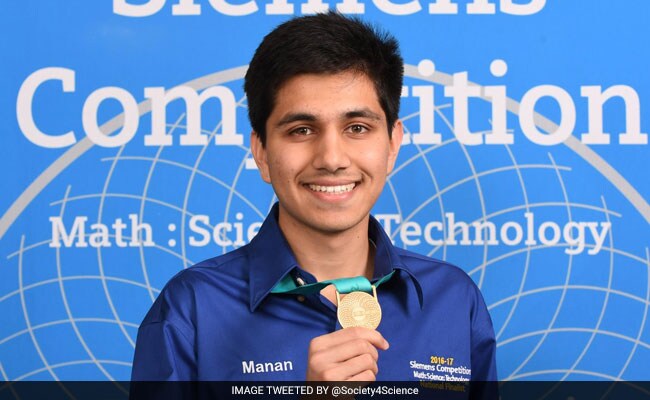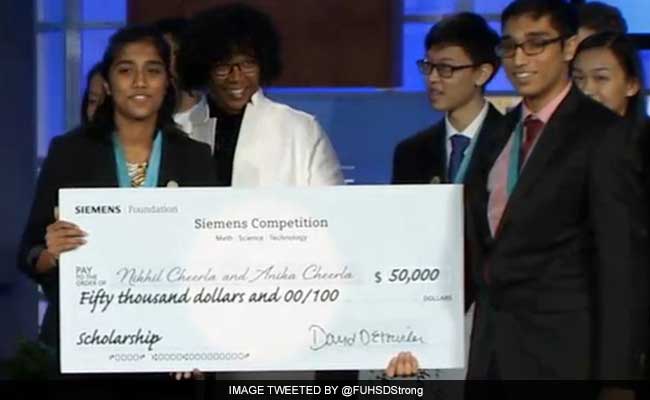
Adhya and Shriya Beesam's method for early diagnoses of schizophrenia won the team prize.
New York:
Indian-origin identical twin sisters and another teen got $100,000 grand prize scholarships in the 17th annual Siemens Math, Science and Technology Competition with their medical projects.
Adhya and Shriya Beesam shared the grand prize for teams in the competition finals on Tuesday for their project developing a method for early diagnoses of schizophrenia using both brain scans and psychiatric evaluations. Both of them are eleventh-grade students in Plano, Texas.
Vineet Edupuganti took the individual grand prize with a biodegradable battery that can be used to power medical devices.
 It is for use in devices that can be swallowed to diagnose and track conditions affecting internal organs. He is a final year high school student in Portland in Oregon state.
It is for use in devices that can be swallowed to diagnose and track conditions affecting internal organs. He is a final year high school student in Portland in Oregon state.
David Etzwiler, CEO of the Siemens Foundation, said the Beesam twins and Mr Edupuganti "are poised to transform the lives of millions around the globe by helping us advance medical knowledge and technologies designed to diagnose and treat various diseases".
Three Indian-origin teens took other prizes in the individual category and two others shared a team prize. In the individual category scholarship awards, high school final year students Manan Shah of Los Altos, California, received $50,000; Prateek Kalakuntla from Plano, Texas, got $30,000, and Pranav Sivakumar, of Tower Lakes, Illinois, picked up $20,000.
In the individual category scholarship awards, high school final year students Manan Shah of Los Altos, California, received $50,000; Prateek Kalakuntla from Plano, Texas, got $30,000, and Pranav Sivakumar, of Tower Lakes, Illinois, picked up $20,000.
Nikhil Cheerla, a high school final year student, and Anika Cheerla, a tenth-grade student, from Cupertino in California shared the $50,000 scholarship team prize.
 In the competition sponsored by the Siemens Foundation, 2,146 school students participated with 1,600 projects.
In the competition sponsored by the Siemens Foundation, 2,146 school students participated with 1,600 projects.
From this pool 19 national finalists were selected for the final competition at George Washington University in Washington.
Adhya and Shriya Beesam shared the grand prize for teams in the competition finals on Tuesday for their project developing a method for early diagnoses of schizophrenia using both brain scans and psychiatric evaluations. Both of them are eleventh-grade students in Plano, Texas.
Vineet Edupuganti took the individual grand prize with a biodegradable battery that can be used to power medical devices.

Vineet Edupuganti won the individual grand prize with a biodegradable battery.
David Etzwiler, CEO of the Siemens Foundation, said the Beesam twins and Mr Edupuganti "are poised to transform the lives of millions around the globe by helping us advance medical knowledge and technologies designed to diagnose and treat various diseases".
Three Indian-origin teens took other prizes in the individual category and two others shared a team prize.

Final year student Manan Shah of Los Altos, California, received $50,000.
Nikhil Cheerla, a high school final year student, and Anika Cheerla, a tenth-grade student, from Cupertino in California shared the $50,000 scholarship team prize.

Nikhil Cheerla and Anika Cheerla shared the $50,000 scholarship team prize.
From this pool 19 national finalists were selected for the final competition at George Washington University in Washington.
Track Latest News Live on NDTV.com and get news updates from India and around the world

